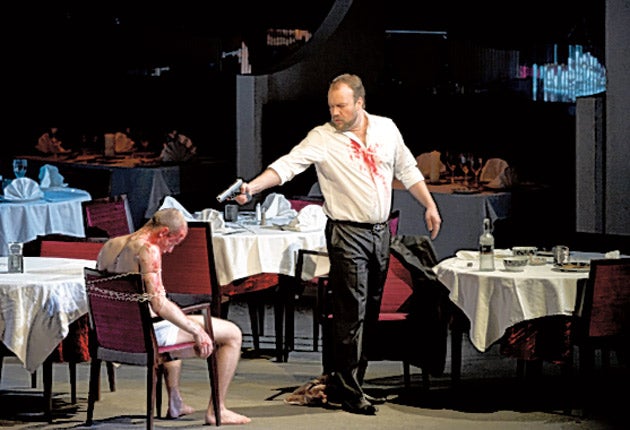Guns, girls and God in a tale for our times
The Royal Opera's first staging of The Tsar's Bride invites chilling comparisons with today's Russia, says Jessica Duchen

Intrigue and intimidation, power and poison – such is the stuff of Rimsky-Korsakov's opera, The Tsar's Bride, which is opening this month at the Royal Opera House, Covent Garden, for the first time. The innocent Marfa is chosen from a selection of girls to become the bride of Ivan the Terrible, but falls victim to a network of jealousy and vested interests and is ultimately murdered. This might look typically operatic if its context didn't also make it seem so real: in this tale of corruption, venality and violence among the hangers-on of the Russian court, you can almost smell the polonium sushi.
Its director, Paul Curran, has set the opera squarely in the present day. He knows a thing or two about contemporary Russia: "I've worked there a lot and I speak Russian," he confirms. It is a 100 per cent historical, he adds – though the real Marfa took two weeks to die a slow, agonising death.
Modern Russia, Curran adds, holds chilling parallels with the opera's 16th-century world: "Today you see skinheads around the streets tattooed with images of dogs," he says. "The dog was the symbol of the oprichniki – the Tsar's secret police: a creature that could sniff things out, attack and destroy. The opera feels like a comment on a modern, chauvinist, racist, nasty aspect of society. I'm sure that's what Rimsky-Korsakov was writing about, even in his own time."
The Tsar's Bride dates from 1898 and in Russia it has long been staple operatic repertoire – yet this is its first staging by the Royal Opera. Perhaps that's partly because Rimsky-Korsakov has always been best known here for his exotic-sounding evocation of the Arabian Nights in Scheherazade. We tend to see him as a composer of magical fairy-tales rather than gritty political dramas, let alone something that, according to Curran, resembles "an episode of The Sopranos".
Fairy tales were only one side of the composer's work. Rimsky-Korsakov, who was in the Russian navy, was knowledgeable about politics and critical of his country's governance. Many of his 15 operas are based on historical topics, often chosen for their pertinence.
The Tsar's Bride escaped censure, but his final opera, The Golden Cockerel, though ostensibly historical, bore such parallels to the then ongoing situation between Tsar Nicholas II, Alexandra and Rasputin that it was banned.
According to Sir Mark Elder, who will conduct it, "The music is like Verdi with vodka. I think it's Rimsky-Korsakov's best opera," he adds. "It's brilliantly written for the voice – a true Russian form of bel canto. It needs really great singers; as for the conducting, I'm trying to get bite and thrust and pacing to it, so when the lyrical moments arrive and the private lives of these characters go so sour and so mad, one is very touched."
The score, he says, is extremely beautiful – contrasting with, and therefore highlighting, the brutality of the action. Parts of it, he says, echo the rugged Slavic power of Mussorgsky. Others seem haunted by Tchaikovsky, "especially his gift for evoking atmosphere with a few perfectly-chosen notes".
The cast includes a number of Russian singers, two of whom – Ekaterina Gubanova and Marina Poplavskaya – were both members of the ROH's Jette Parker Young Artists Programme and are now making triumphant return visits as leading ladies. "I was nervous about presenting our Russian singers with such a contemporary interpretation," Curran admits, "but all of them have been hugely enthusiastic about it.
"As we're setting it in a modern context," he says, "people will recognise the contrast between these guys carrying guns, having a sleazy time with expensive champagne and strippers in a bar, then saying 'Oh, it's time for us to go to Mass'. Everything is done in the name of Tsar, in the name of the Russian people, but most of all in the name of religion. And that's where the parallel across the centuries is almost too strong."
'The Tsar's Bride', Royal Opera House, London WC2 (020 7304 4000) in rep 14 April to 2 May
Subscribe to Independent Premium to bookmark this article
Want to bookmark your favourite articles and stories to read or reference later? Start your Independent Premium subscription today.

Join our commenting forum
Join thought-provoking conversations, follow other Independent readers and see their replies